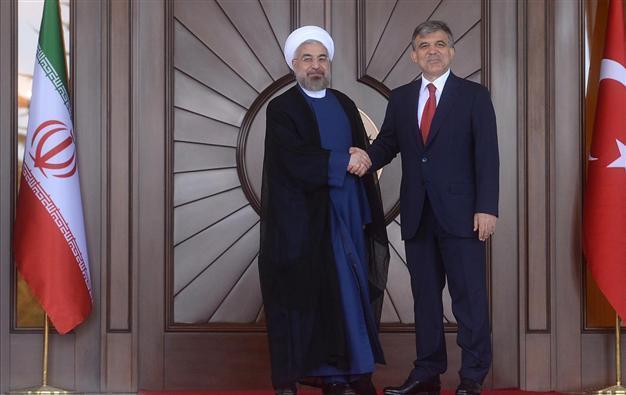Turkey, Iran on different page in Syria but ties ‘strategic’
ANKARA

Iranian President Hasan Rouhani and President Abdullah Gül shake hands at the Çankaya presidential palace in Ankara, June 9. AA Photo
Iranian President Hasan Rouhani arrived in Ankara early June 9 for crucial talks on a number of key issues in his first official trip to Turkey since he took over the presidency last year.
“Turkey and Iran, as the region’s two powerful countries, are determined to continue consultations about extremist terror. Violence and extremism rooted in our region are against the interests of all countries. The terrorist groups that have emerged in Syria and those – mainly Western countries - who have supported or tolerated them have already regretted that. Those who did not regret until today, will regret it tomorrow,” Rouhani told at a joint press conference with Prime Minister Recep Tayyip Erdoğan following the meeting of High-Level Strategic Cooperation Council.
Rouhani said Turkey and Iran could play an important role in the fight against violence and extremism as part of Tehran’s application to the U.N. to launch a global initiative. “The fight against terror is the duty of us all. It’s an obligation for the security and stability of our region,” he said.
The Iranian president drew a totally different picture on Syria compared to the Turkish stance, arguing that the recent presidential elections there were the "first step to stability and peace." Rouhani said Syrians would determine their future after "expelling foreign terrorists" from the country and "ending violence." He also confirmed that he sent a congratulatory message to President Bashar al-Assad following his election victory.
Ties with Iran important for the world: Gül
Earlier in the day, Rouhani was welcomed by Turkish Water and Forestry Minister Veysel Eroğlu and other governmental officials, after his plane, carrying an Iranian delegation composed of one vice president, seven ministers and a number of businessmen, landed in Ankara.
Rouhani directly went to the Çankaya Palace where he was welcomed by President Abdullah Gül at an official ceremony. In line with Iranian protocol rules, Rouhani did not visit Anıtkabir, the mausoleum of the founder of modern Turkey, Mustafa Kemal Atatürk, even though the visit is part of Turkish state protocol rules implemented for official visits of foreign leaders.
The two presidents announced that they have decided to improve bilateral relations at the joint press conference following their meeting. “[Rouhani] is the first Iranian president who has paid an official visit to Turkey in the last 18 years. This is why the visit is historic,” Gül said, describing Iran as “an old, valuable friend.”
“The visit carries our bilateral relations forward in every area. We expressed our common will during the meeting,” Gül said, adding that several deals from culture to the economy had been agreed upon.
“Our relations are not just about two countries. They are important for the whole region and the world,” Gül said, repeating that Ankara wants a Middle East without weapons of mass destruction, while supporting very country’s right to the peaceful use of nuclear energy.
The two presidents also said they will meet businessmen from both countries on June 10 to encourage them to invest in the respective countries.
Describing Turkey as one of the most important countries in the region, Rouhani said his administration’s foreign policy priority was to increase relations with neighboring countries. Recalling his meeting with Erdoğan in Tehran in January, Rouhani said important agreements on transportation, customs, tourism, culture, security and political relations would be signed during the talks.
“Everybody acknowledges both Turkey and Iran’s geopolitical importance. When these two countries come together, a link between the Gulf of Oman, the Black Sea and to the Mediterranean will be possible. In other words, connecting the Indian Ocean to the Atlantic Ocean. That’s why relations between these two important countries are not only significant for Turkey and Iran but also for the development of entire region,” Rouhani added.
‘Reducing gas prices not easy’
One of the questions asked to Rouhani during his press conference with Erdoğan was a about the much-debated issue related to the price of the natural gas Turkey was buying from Iran. Turkey insistently sought reduction in natural gas prices but could not have a positive response from Iran.
“The price of the natural gas has multiple parameters and is fixed through a special formula. It’s not an easy thing. Everybody is focused only on the price, but there are other issues as well,” Rouhani said. He informed that Turkish and Iranian energy ministers will continue to work over the night to come to a solution over gas prices and future deals the two countries could make.
Erdoğan, for his part, said he was hoping that a deal will be reached after negotiations. “Of course, we are looking ways how to provide cheaper gas to our people’s consumption and to produce cheaper electricity,” Erdoğan said, adding Turkey was willing to buy more gas from Iran if there could be an adjustment in prices.
The two officials reiterated their objectives to increase the trade volume to $30 billion by the end of 2015. Erdoğan said Turkey is planning to ratify the agreement of preferential trade with Iran until the end of this month so that they could reach their objective.

















